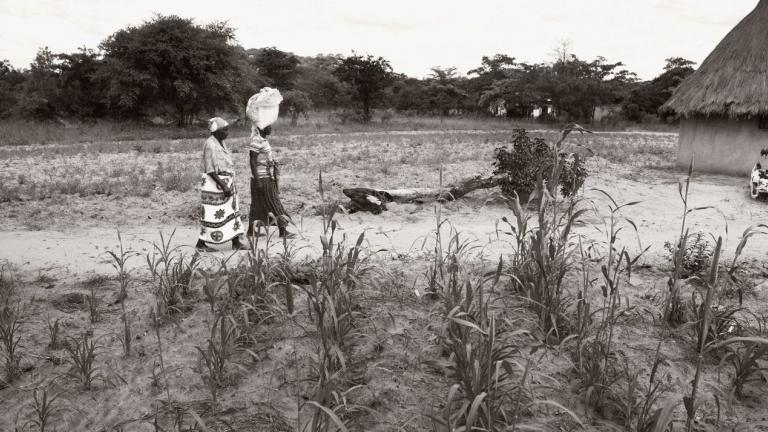
Julius Mutero has harvested virtually nothing in the past six years. For his entire adult life, he has farmed a three-hectare plot in Mabiya, a farming community in eastern Zimbabwe. There he grows maize and groundnuts to feed himself, his wife, and their three children. He sells whatever’s left for cash.
But over a decade ago, his area started getting less rain and the rivers dried up. What was already a hot climate, with temperatures that could reach 30 °C (86 °F), began recording summer highs up to 37 °C (99 °F) on a regular basis. Now the rainy season begins in late December instead of early November, and it ends sooner too. In the driest months, dust billows across sunbaked farmlands where only thorny shrubs remain.
Years of severe droughts have wiped out all Mutero’s crops. He tried planting maize varieties that mature early, but even they didn’t survive. And with no pastures for his livestock, he watched helplessly as all seven of his cows died.
“Life is now extremely hard here,” Mutero says. His family survives largely on food aid supplied by nonprofits or Zimbabwe’s government, but it’s not enough.
He feels he has no choice but to abandon his home in search of water. He’s fortunate—a traditional leader has promised him a small piece of land about 30 kilometers from Mabiya in the country’s Eastern Highlands, which get more rain and heavier mists than the rest of the country.
When we spoke in October, Mutero was planning to build a new home and relocate his family by year’s end. But he was nervous. “I don’t know what my family and I will face and how we will be received,” he said.
Mutero is just one of the 86 million people in sub-Saharan Africa who the World Bank estimates will migrate domestically by 2050 because of climate change—the largest number predicted in any of six major regions the organization studied for a new report.
In Zimbabwe, farmers who have tried to stay put and adapt by harvesting rainwater or changing what they grow have found their efforts woefully inadequate in the face of new weather extremes. Droughts have already forced tens of thousands from the country’s lowlands to the Eastern Highlands. But their desperate moves are creating new competition for water in the region, and tensions may soon boil over.
Read the full article at: https://www.technologyreview.com/2021/12/17/1041315/climate-migration-africa-zimbabwe/





